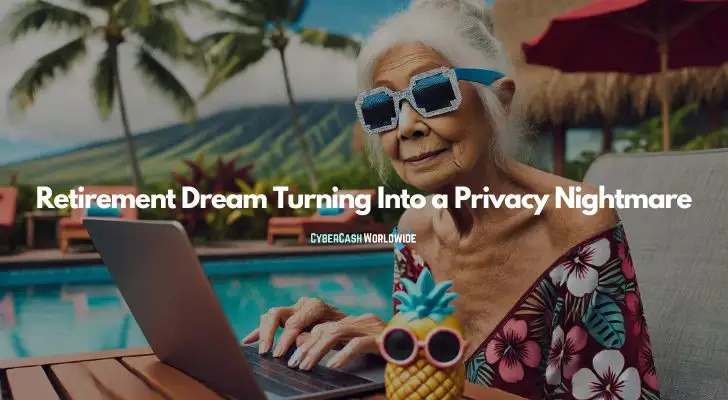Retirement is often seen as the golden chapter of life—a time to relax, enjoy hobbies, and live peacefully. However, the modern world has introduced unexpected complications that many retirees may not anticipate. Privacy concerns have started creeping into this serene phase, turning the dream into something more unsettling. Let’s check out how retirement is becoming less private and explore some wacky and unconventional ways to regain control.

The Ubiquity of Smart Devices
Smart technology promises convenience but often demands personal data in return. Retirees adopting these devices may unintentionally compromise their privacy, leaving themselves vulnerable to data collection. This trade-off creates risks that can invade your daily life.
- Smart home assistants listen constantly. These gadgets, like voice-controlled speakers, stay on to respond instantly. While they’re useful for setting reminders or playing music, they also record conversations that could be stored or analyzed.
- Health trackers store sensitive information. Wearable devices track heart rates, sleeping patterns, and exercise routines. Companies collecting this data may share it with advertisers or insurance firms.
- Smart TVs monitor viewing habits. These televisions often collect information on what shows you watch and when. This data is used to target ads, blurring the line between entertainment and surveillance.
- Security cameras share footage online. Many home security systems upload video feeds to cloud storage. If poorly secured, these feeds could be accessed by unauthorized users.
Could you imagine your devices piecing together your entire routine without your knowledge? How far are you willing to go for convenience versus privacy?
Retirement Villages With Hidden Cameras
Retirement villages promise a stress-free environment but sometimes include security systems that overstep boundaries. While safety is a legitimate concern, excessive surveillance can feel oppressive.
- Common areas are often monitored. Surveillance cameras cover shared spaces like lounges or dining halls. While intended to deter crime, they also reduce residents’ sense of privacy.
- Keycards track movements. Some villages use keycards to record when residents enter or exit rooms. This data might be used for safety but raises questions about over-monitoring.
- Activity tracking apps are encouraged. Residents may be asked to use apps to log activities or health updates. These apps often require access to private information.
- Staff may have access to too much information. Personal health and behavioral data could be shared with caretakers unnecessarily. This over-sharing could make residents feel exposed.
How comfortable are you with being monitored in spaces meant for relaxation? Could these measures make you feel safer, or do they create unnecessary stress?
Unexpected Data Collection From Leisure Activities
Even hobbies and leisurely pursuits are now ripe for data collection. Many retirees are unaware of how their favorite activities expose them to privacy risks.
- Online classes request detailed profiles. Virtual classes for painting or cooking often ask for more information than needed. This data could then be used to target ads or sold to third parties.
- Social media groups for hobbies track interests. Joining a gardening or knitting group online generates detailed interest profiles. These profiles are used to predict buying habits.
- Booking travel online tracks locations. Retirees booking vacations through travel sites often have their preferences saved. These records could be shared with marketing companies or even hackers.
- Fitness centers use apps that monitor progress. Gym apps often require detailed personal data, such as weight or exercise history. Such information may be stored indefinitely or shared without notice.
Are you willing to trade your leisure time for the cost of your personal data? How can you make your hobbies more private while still enjoying them?

Wacky Ways to Take Back Control
Privacy concerns may feel overwhelming, but creative and unconventional methods can help retirees regain some control over their data.
- Create false profiles for online accounts. When signing up for services, use alternative names or details. This simple trick can help protect your identity and make tracking more difficult.
- Use low-tech solutions instead of smart devices. Swap a smart thermostat for a manual one or use a traditional radio instead of a smart speaker. These changes limit unnecessary data collection.
- Wrap smart devices in foil when not in use. This may sound strange, but it can block certain signals, ensuring the devices aren’t listening. It’s a simple and effective hack for privacy-conscious individuals.
- Opt for cash payments whenever possible. Using cash instead of cards reduces the digital trail you leave behind. This can make it harder for companies to track your spending habits.
Could embracing these quirky tactics make privacy fun? How far would you go to outsmart modern surveillance?
Fun Experiments to Outsmart Surveillance
Taking back privacy doesn’t have to be dull. Retirees can turn it into a series of entertaining experiments to feel more in control.
- Speak in code around smart devices. Replace common phrases with quirky alternatives when discussing personal matters. This confuses data algorithms and makes collected information less useful.
- Set up decoy searches online. Regularly search for topics you have no real interest in. This creates a misleading digital profile that advertisers find hard to interpret.
- Dress like someone else when shopping. Wear hats or glasses that obscure your features in public. Some facial recognition systems struggle with subtle disguises.
- Share misinformation on social media. Post fictitious updates about hobbies or interests to throw off algorithms. It’s a fun way to confuse data collectors.
Could these playful tactics create a digital camouflage? Would making privacy playful change your perspective on personal data?
Rethinking Privacy in Retirement
While technology and data collection feel inescapable, retirees can rethink their relationship with privacy. Adopting a skeptical mindset and proactive habits could make all the difference.
- Ask questions about devices before buying. Always inquire how a product collects and uses data. This helps you decide which gadgets align with your privacy preferences.
- Disable unnecessary features. Turn off voice activation or data-sharing options on devices. These small changes can significantly reduce privacy risks.
- Hold tech-free days. Dedicate certain days to completely unplugging from smart devices. Use this time to enjoy low-tech activities like reading or gardening.
- Join privacy advocacy groups. Participate in local meetups or online forums focused on privacy rights. Sharing tips and insights can empower individuals to take collective action.
How much of your personal data is truly necessary for convenience? Could prioritizing privacy improve your peace of mind?
Wrapping It All Together
Retirement should be a time to enjoy life without constant monitoring or intrusion. While privacy concerns are real, retirees have plenty of creative options to regain control over their personal data. By staying informed and taking playful, proactive steps, they can turn a potential nightmare into a more peaceful reality.
How I "Finally" Make Over $7,000 Monthly Income
"The most valuable thing I've ever done!"
